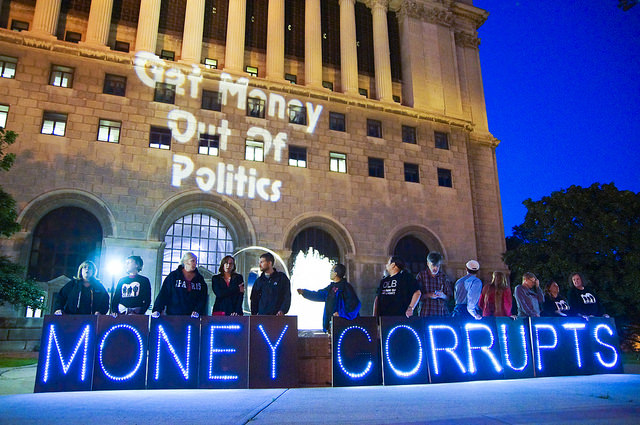Political money flourishes in the dark – and the sun set with Citizens United
Is there any doubt left that Citizens United was a watershed event in American politics? We’re three elections into this brave new world and from my vantage point, it looks like the culture has really taken hold.
Sure, we’ve had dark money in Michigan politics for years. But the domination of campaigns by independent spenders over candidates was never this complete.
Terri Land vs. Gary Peters? Outside spenders have carried the day.
Rick Snyder vs. Mark Schauer? It’s closer, but outsider spenders have a bigger footprint than the candidates in that one too.
Unfortunately, the most visible part of the campaigns for most of us is television advertising.
But don’t think you’ll be able to learn what happened by looking at the official record that’s compiled by the Bureau of Elections for the State of Michigan.
Here’s what my most recent data from the Campaign Media Analysis Group show for broadcast advertising about state candidates, through October 26th:
Attorney General campaign:
Team Totten - Michigan Democratic State Central Committee: $106,000; Mark Totten: $436,000
Team Schuette - Michigan Advocacy Trust: $1,114,000; Bill Schuette: $580,000.
Gubernatorial campaign:
Team Schauer - Democratic Governors Association: $8,686,000; NEA Advocacy Fund: $44,000; Mark Schauer: $2,506,000
Team Snyder - Republican Governors Association: $6,450,000; Michigan Republican Party: $765,000; Independence USA PAC: $1,292,000; Rick Snyder: $7,207,000
Supreme Court campaign:
Democratic nominees - Richard Bernstein: $612,000
Republican nominees - Michigan Republican Party: $2,264,000; Center for Individual Freedom: $94,000; Brian Zahra and David Viviano: $269,000
In the end, the state will have a full accounting of the candidates’ receipts and expenditures, and no record whatever about who put the money for the ads in the other committees.
In reality, it’s not quite that dire. Independence USA is a federal super PAC that gets all its money from Michael Bloomberg and reports to the Federal Election Commission. The NEA must report any contribution over $5,000 to the U.S. Department of Labor. The RGA and the DGA report their receipts and expenditures to the IRS – but the accounting for Michigan is intertwined with all the rest of the states.
We can see some things clearly, some things less clearly and some things not at all.
Why does it matter? Because people and interest groups don’t write five-, six- and seven-figure checks for selfless reasons. Big political spenders are looking for considerations. Transparency is how we recognize when those considerations are ethical violations. Transparency is our inoculation against corruption.
Contemporary political campaigns are more than a little frustrating. It feels like the meddlesome wealthy in Houston, San Francisco and Manhattan have a lot more say about who will represent us than we do - even though they probably couldn’t pick their candidate out of a police lineup. I guess that’s the way the Roberts court wants it to be.
Tuesday, the campaign ends and the game changes. Rich or poor, young or old, brown or white, we are equal in the voting booth. We all have the same say about who will represent us.
If we’re very lucky we’ll elect public officials with the wisdom and courage to serve our common good.
See what new members are saying about why they donated to Bridge Michigan:
- “In order for this information to be accurate and unbiased it must be underwritten by its readers, not by special interests.” - Larry S.
- “Not many other media sources report on the topics Bridge does.” - Susan B.
- “Your journalism is outstanding and rare these days.” - Mark S.
If you want to ensure the future of nonpartisan, nonprofit Michigan journalism, please become a member today. You, too, will be asked why you donated and maybe we'll feature your quote next time!


 Money will never be entirely absent from politics, but the tsunami unleashed by Citizens United certainly changed the landscape. (Photo by Flickr user Light Brigading; used under Creative Commons license)
Money will never be entirely absent from politics, but the tsunami unleashed by Citizens United certainly changed the landscape. (Photo by Flickr user Light Brigading; used under Creative Commons license)